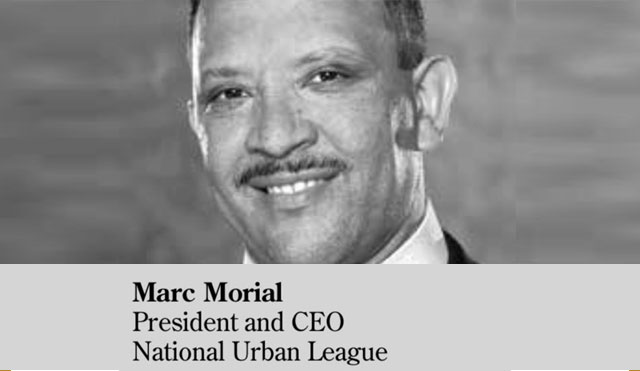
Marc H. Morial President and CEO National Urban League
NEW YORK – This week marks the beginning of Pride Month, which commemorates the 1969 Stonewall Uprising, a turning point in the movement for LGBTQ rights. “It’s a time for those of us in the racial justice movement to affirm our solidarity and acknowledge – as the late Congressman John Lewis said – “You cannot have equality for some in America and not equality for all.” For those of us who are African American, whose forefathers and foremothers endured the oppression of slavery, segregation, and discrimination, we are morally bound to stand on the front lines with our LGBTQ brothers and sisters. More than 40 percent of LBGTQ Americans identify as people of color. Their rights are our rights.
The movement for gay liberation is inextricably bound to the movement for racial equality, and has been led by LGBTQ people of color such as civil rights icon Bayard Rustin, “the mayor of Christopher Street,” Marsha P. Johnson, writer and activist James Baldwin, and #BlackLivesMatter co-founder Alicia Garza. Years before Stonewall, teenagers inspired by the lunch counter protests in Greensboro, North Carolina staged a sit-in at a Philadelphia restaurant called Dewey’s, in response to Dewey’s recently implemented discriminatory policy claiming it would not serve “homosexuals,” “masculine women,” “feminine men,” nor “persons wearing non-conformist clothing.”
Early activists who attended the 1963 March on Washington took heart from Rustin’s leadership. Segregationists had tried to discredit the march by exposing Rustin’s sexual orientation. A few weeks before the march, South Carolina Senator Strom Thurmond famously attacked Rustin as a “Communist, draft-dodger, and homosexual,” and had the file from his 1953 arrest on sex charges entered in the Congressional Record, but their efforts failed, and the March galvanized support for the Civil Rights Act.
More than two decades after he organized the March, Bayard Rustin declared that gay people were the new barometer for social change.
It wasn’t that racism had been eliminated by 1986, but the Civil Rights Act gave Black Americans legal recourse against discrimination. In 1986, when Rustin was testifying in support of New York State, LGBTQ Americans had almost no recourse against discrimination. Today, in half the states, they still have little recourse. In 25 states, there are no explicit statewide laws at all protecting people from discrimination on the basis of sexual orientation or gender identity in employment, housing and public accommodations. The Equality Act would change that. The Equality Act would amend the Civil Rights Act of 1964 to prohibit discrimination on the basis of sex, sexual orientation and gender identity in employment, housing, public accommodations, education, and other key areas of life.
The Equality Act has been introduced four times in consecutive sessions of Congress, and has passed the House twice, in 2019 and again this past February. The National Urban League is proud to support the bill and we join our advocacy partners in urging the Senate to pass it.
In a 1986 speech to students at the University of Pennsylvania, Rustin compared Stonewall to the Montgomery Bus Boycott. “…something began to happen,” he said. “People began to protest. They began to fight for the right to live in dignity, the right to resist arbitrary behavior on the part of authorities, the right essentially to be one’s self in every respect, and the right to be protected under law. In other words, people began to fight for their human rights.”
Recommended For You.



Be the first to comment